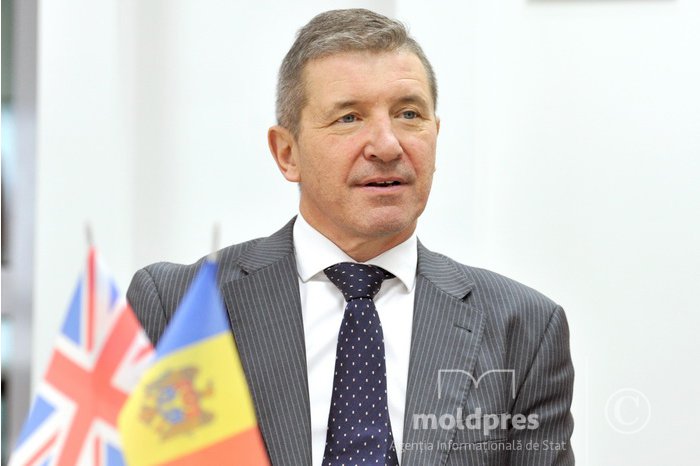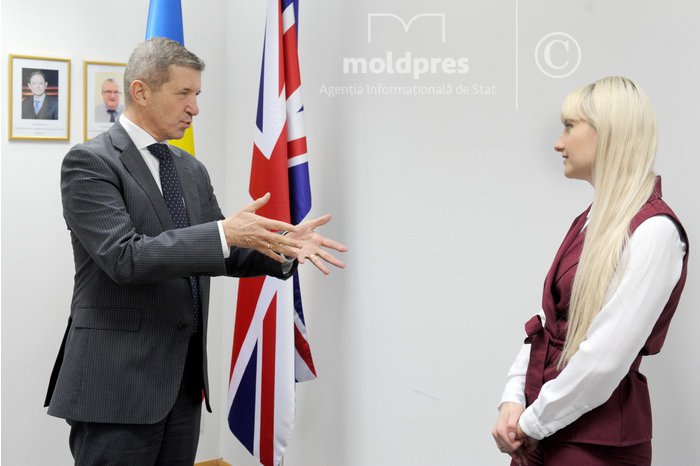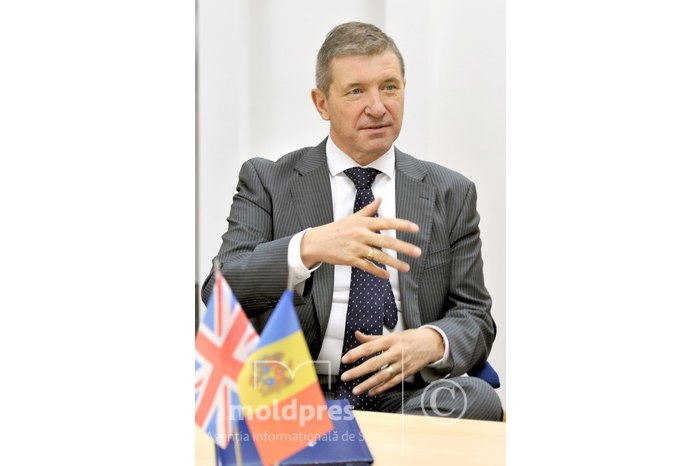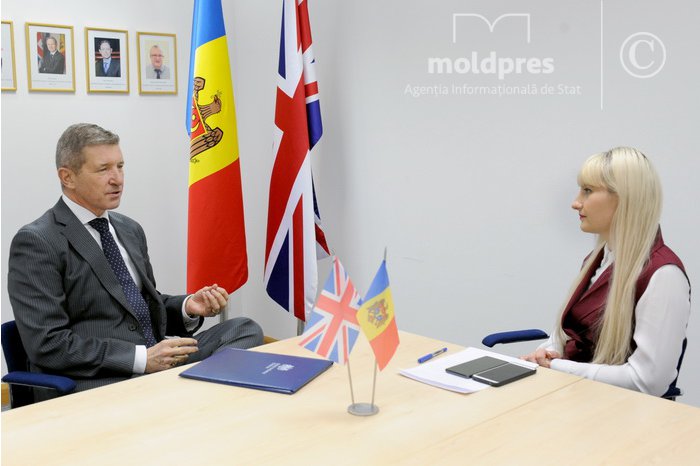Ambassador of United Kingdom to Moldova says current leadership manages to improve country's image, give confidence to those willing to invest in Moldova
19:54 | 09.02.2023 Category: Interview, Event
Ambassador of the United Kingdom of Great Britain and Northern Ireland to Moldova Steven Fisher has given an interview exclusively with the MOLDPRES State News Agency on topical subjects, bilateral relations and imposing of anticorruption sanctions.
MOLDPRES: Mr. Ambassador, which would be the most important achievements in the Moldovan-British cooperation on the political, economic and cultural dimensions?
Steven Fisher: In those 31 years of diplomatic relations, we have established a quite close cooperation between the United Kingdom and Moldova. There is a very good collaboration within international and multilateral forums, such as the Human Rights Council of the United Nations Organization and OSCE. Our states often have the same positions, opinions and interests within international organizations. In 85 per cent of cases, the United Kingdom and Moldova vote the decisions in the same way. At the same time, there are four basic fields in which we cooperate: defence sector, development, education and justice. In the defence sector, we have a very good cooperation in the reformation of the Armed Forces’ military system. There is a military attaché with residence in Moldova. At the same time, trainings of Moldovan servicemen take place both in Moldova and in the Great Britain. Also, on the days to come, the Minister for Armed Forces of the United Kingdom will pay a visit to Chisinau.
As for the defence sector, ever since the beginning of our diplomatic relations, the Department for International Development of the United Kingdom has been present in Moldova, which provides support needed in more fields, among which agriculture. At the same time, starting from 2015, the Great Britain has financed more projects, including in the field of good governance, worth 21 million pounds in all. Also, this year, at the first edition of the Moldova Support Platform, held in Paris, the United Kingdom announced a financial assistance, through diverse projects, worth 12 million pounds – money provided during three years.
At the same time, in the education sector, there is the educational programme on providing Chevening scholarships, which implies a master scholarship with duration of one year. During 30 years, about 110 people have benefited from this scholarship, who were accepted to the most prestigious universities from the United Kingdom. Each year, the number of stipended students increases and we hope that this programme will be, in continuation, as attractive as before.
As for the justice field, there is a quite good cooperation between the authorities of the two states. At the same time, there are collaboration relations with the National Crime Agency from the UK, Customs Service and Prosecutor’s Office.
Also, in 2020, the Agreement on Strategic Partnership, Trade and Cooperation between the United Kingdom and Moldova was signed, which sees, inter alia, the increase in the bilateral commerce. Presently, the trade index is not so high; yet, I am sure that we can develop this sector. The present leadership has managed to improve the country’s image internationally and to give confidence to those willing to invest in Moldova. The country became more attractive for investors, who are interested in the field of renewable energy and the one of creative industry. Thus, the first creative centres of the country: ArtCor și MediaCor, were opened including with the support of the United Kingdom.
MOLDPRES: In late last year, the government of the Great Britain announced a package of sanctions, through which all assets held by Vladimir Plahotniuc and Ilan Shor in the United Kingdom and on the territory of UK will be frozen. What assets is it exactly about and which their value would be? Is the state to impose sanctions also against other people prosecuted for corruption acts in Moldova?
Steven Fisher: On 9 December, the government of the United Kingdom, based the Global Anti-Corruption Sanctions Regulations, sanctioned two Moldovan citizens: Vladimir Plahotniuc and Ilan Shor. The British government found out that there was evidence proving their involvement in big corruption schemes. Thus, all movable assets, real estate and assets held by the sanctioned citizens in the United Kingdom, and the overseas territories, such as the Cayman Islands, Virgin Islands, will be frozen. Also, the entrance and stay of these people in the Great Britain is banned. At the same time, the financial assets are frozen and financial transactions cannot take place, except for the legal consultancy services, as these people have right to legal representation in court. Thus, the sanction is not imposed in case of the legal assistance requested by the concerned persons. Certainly, the United Kingdom will keep an eye on the situation in Moldova, in order to see whether it is necessary to include other people in the list of sanctions; yet, it is quite important for each case to be reasoned at the legal level.
MOLDPRES: More people prosecuted by Moldovan prosecutors would stay in London. It is about Veaceslav Platon, Constantin Botnari and Gheorghe Cavcaliuc. In which conditions these persons might be extradited to Moldova to appear before court?
Steven Fisher: Personally, I cannot confirm or deny the presence of legal cases or cases in court against these people. I can say you that all people, no matter the countries they come from, must go through the same action at law and nobody can find a ‘’paradise’’ for corrupts and criminals in our country. Our law-enforcement agencies have a very good relation with the partner institutions from the origin countries of the people and if these institutions present well-reasoned cases at the legal and juridical level, with certain evidence, our competent institutions will do their utmost to analyze and accept the requests from these countries. I assure you that we work with our partners from Moldova, in order to help them repatriate the citizens, so as to appear before court. As for the extradition, this works at the bilateral level. If Moldovan institutions wanted their citizen to be extradited in Moldova, this should be requested by legal means at the bilateral level and the British Crown Prosecution Office will analyze these legal requests. If major evidence of criminality is detected in this file, the British institution will accept the cause and will send it to court. The action itself will take place, only after the court session is held and the magistrate issues a ruling on the extradition or non-extradition of the person. Thus, everything depends on how well the arguments are presented and on the ruling of judges from the United Kingdom. I know about these three persons from media, but I cannot comment on the existence of certain requests or actions at law started against them.
MOLDPRES: Last year, the Great Britain returned Moldova more than 458,000 pounds – money confiscated from Luca Filat, the son of the former prime minister, Vlad Filat. The money reached over 550 personal assistants for people with severe disabilities from Moldova. Are there any other Moldovan funds with illegal origin, which are to be confiscated by the UK authorities?
Steven Fisher: The action took place through the enforcement of the unexplained wealth law. This law consists in the fact that, when there is an unexplained wealth, the authorities of the Great Britain analyze these assets/money and report to the financial institutions from the UK. The concerned person was spending money of unknown origin in a quite suspicious way. Thus, the authorities admitted the unexplained wealth order and confiscated the sum of money. Subsequently, things got to the Law Court and a decision on returning this money to Moldova was to be issued or not, as the authority has right to retain the resources or to return them. Moldova gave guarantees that this money would be spent correctly, without being stolen again; therefore, the judges ruled to return the money to the country. In the aforementioned case, there were two dubious reasons which stayed at the basis of the money’s confiscation: the purchasing of an extremely expensive vehicle (several hundreds of thousands of pounds) by a student and the renting of a quite costly dwelling. In the trial, the person was not able to explain the origin of the money; therefore, the magistrates ruled to confiscate it.
The law works quite well, there are daily numerous dubious transactions which are analyzed by British authorities and it is quite possible that also other Moldovan citizens make a suspicious transaction which will be reported to the British authorities and this law will be enforced in this case again. I cannot say whether also other Moldovans are presently concerned in pending files regarding the confiscation or freezing of a sum of money under the aforementioned law.
MOLDPRES: According to the Public Services Agency, 233 enterprises with capital coming from the United Kingdom work in Moldova, with the investments in the share capital standing at about 442 million lei. Which are the principal fields of work of the companies and how attractive is Moldova’s market for them?
Steven Fisher: The IT services from Moldova are quite demanded in the United Kingdom, which is an important element of the bilateral trade, in favour of Moldova. At the same time, the British companies want to invest in such sectors as renewable energy and creative industries. The United Kingdom exports to Moldova automobiles, alcoholic beverages and machinery for light industry. At the same time, Moldova exports to the UK electric wiring, clothes and textiles, alcoholic drinks, farming products, fruits and vegetables. Presently, we work and we want to increase the volume of the bilateral commerce. In the British media, we find articles about these beverages, which are of quite high quality. At the same time, I am happy that we find Moldovan wines in shops of the Great Britain as well.
MOLDPRES: At present, about 70,000 Moldovans live in the United Kingdom. Which are the legal procedures of entry and the formalization of their stay on the territory of the UK?
Steven Fisher: Really, we estimate that there are over 70,000 Moldovans in the United Kingdom; yet, this number might be larger, as a lot of people use the Romanian passport, without declaring the Moldovan one. After leaving EU, there was a transition process in Great Britain. Thus, those people who have already settled were able to apply for two types of residence visas, in order to legalize their status. It is about a long-term status and a short-term one. People who were getting the long-term status, were able to legalize their stay in the United Kingdom for an indefinite period, while the others - for a definite period; yet, afterwards, they were able to extend their stay. Most Moldovans observed the procedure; there are no problems in this respect. The people who applied for British residence visa on the transition period have free access to medicine, education, labour, just as any British citizen. Following the transition period, there is no difference between the people with Romanian passport and the ones with Moldovan one; the only difference is the fact that the Moldovans with Romanian passport can travel on tourism purposes for a maximal period of three months. At the same time, those who want to settle in the United Kingdom, either to work or to study, must hold certain acts; this is made through the getting of different types of visas.
MOLDPRES: Mr. Ambassador Steven Fisher, thank you for the kindness to give this interview with our agency.




